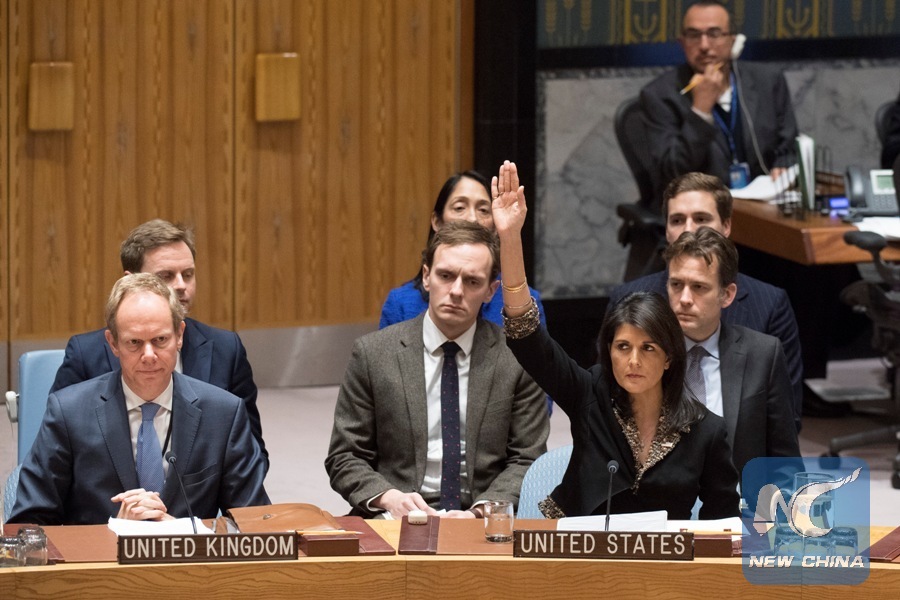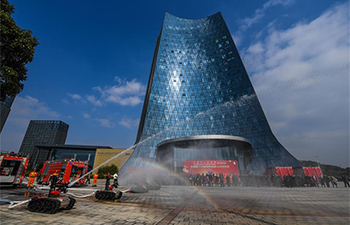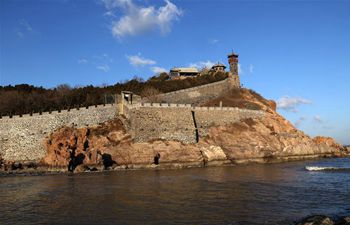
U.S. Ambassador to the United Nations Nikki Haley (R, front) vetoes a UN Security Council draft resolution on the status of Jerusalem at the UN headquarters in New York, on Dec. 18, 2017. The United States on Monday vetoed a Security Council draft resolution on the status of Jerusalem. All other 14 members of the Security Council voted in favor of the Egyptian-drafted text. But as the United States, which is a permanent member of the Security Council, has veto power, the draft resolution failed to be adopted. (Xinhua/UN Photo)
UNITED NATIONS, Dec. 20 (Xinhua) -- The United Nations (UN) General Assembly will meet for a rare emergency session to discuss the status of Jerusalem on Thursday after the United States vetoed earlier an Egypt-drafted request asking Washington to withdraw its decision to recognize the city as Israel's capital.
According to UN sources, Palestinian UN envoy Riyad Mansour said his country hoped that the General Assembly would draft a resolution urging the U.S. move, declared on Dec. 6 by President Donald Trump and triggering large-scale outrage in the Arab and Muslim world, to be withdrawn.
Washington vetoed on Monday a draft resolution submitted by Egypt to the Security Council expressing "deep regret at recent decisions concerning the status of Jerusalem," without explicitly calling out the United States by name.
The resolution sought to ensure that any attempts to alter the characteristics or demographic composition of the Old City of Jerusalem had no effect and were rescinded.
It also demanded that the final status of Jerusalem be decided through direct negotiations between Israel and Palestine, as was included in the previous 10 resolutions on the issue dating back to 1967.
Despite the yes votes cast by all the remaining 14 members, the no vote by the United States, a permanent member and veto-wielding power of the Security Council, was enough to block the passage of the draft.
Mansour was quoted by the Reuters news agency as saying on Monday that he hoped there would be "overwhelming support" in the 193-member General Assembly for a resolution seeking similar demands.
Resolutions raised in the General Assembly, unless those proposed to the Security Council, cannot be vetoed and are not legally binding but will nonetheless catch attention if they see two-thirds of the member states in favor.
Turkey, which doesn't hold a rotating Security Council membership for the time being, requested the General Assembly meeting together with Yemen.
"A two-thirds support in the General Assembly would actually mean the rejection of the decision made by the Security Council," Turkish President Recep Tayyip Erdogan told a press conference Tuesday.
U.S. Ambassador to the UN Nikki Haley said after the Security Council meeting that her country's veto was an embarrassment to the other 14 members rather than the United States.
She later wrote on Twitter that "the U.S. will be taking names" of those criticizing the U.S. choice at the General Assembly.
Ankara and Washington have been experiencing tensions in bilateral ties as Erdogan accused the U.S. government of sheltering Fethullah Gulen, who the president said masterminded last year's failed coup to overthrow him.
Thursday's General Assembly meeting will be a resumption of a rarely-held emergency session which, according to UN Resolution 377 passed in 1950, can be convened to consider a matter "with a view to making appropriate recommendations to members for collective measures" if the Security Council fails to act.
There have been altogether 10 such emergency sessions in the UN history, and the last of its kind was held in 2009 to discuss the situation on the occupied Eastern Jerusalem and Palestinian territories.
China, one of the five permanent members of the Security Council, warned the complicated and sensitive nature of the status of Jerusalem following the U.S. veto, saying the Palestinian issue is at the root of the peace process in the Middle East.
"We support the just cause of restoring the legitimate national rights of the Palestinian people and support the establishment of a fully sovereign, independent State of Palestine based on the 1967 borders with East Jerusalem as its capital. China's position will not change," said Wu Haitao, charge d'affaires of China's permanent mission to the UN.
Palestinian President Mahmoud Abbas, who said the United States was no longer a mediator in Middle East peace -- some of his sharpest rhetoric following Trump's announcement on Jerusalem -- wrapped up visits to Saudi Arabia and Qatar on Tuesday and continued his journey to Paris in efforts to solicit more support for his state, according to his adviser.
The adviser, Nabil Shaath, told reporters in Moscow on Tuesday that the president will travel to the Russian capital soon as well. The Kremlin has expressed willingness to help de-escalate the ongoing tensions surrounding the region.
Saying Moscow was "rather alarmed over the situation around Jerusalem," Russian Foreign Minister Sergey Lavrov told Shaath that his country will do all it can to promote constructive negotiations between Israel and Palestine, according to a report by Russia's TASS news agency.
The status of Jerusalem is at the center of the decades-long Israeli-Palestinian conflict. The Jewish state claims the entire holy city to be its "eternal and indivisible" capital while the Palestinians want to set the eastern part of the city as the capital of an independent Palestinian state.















